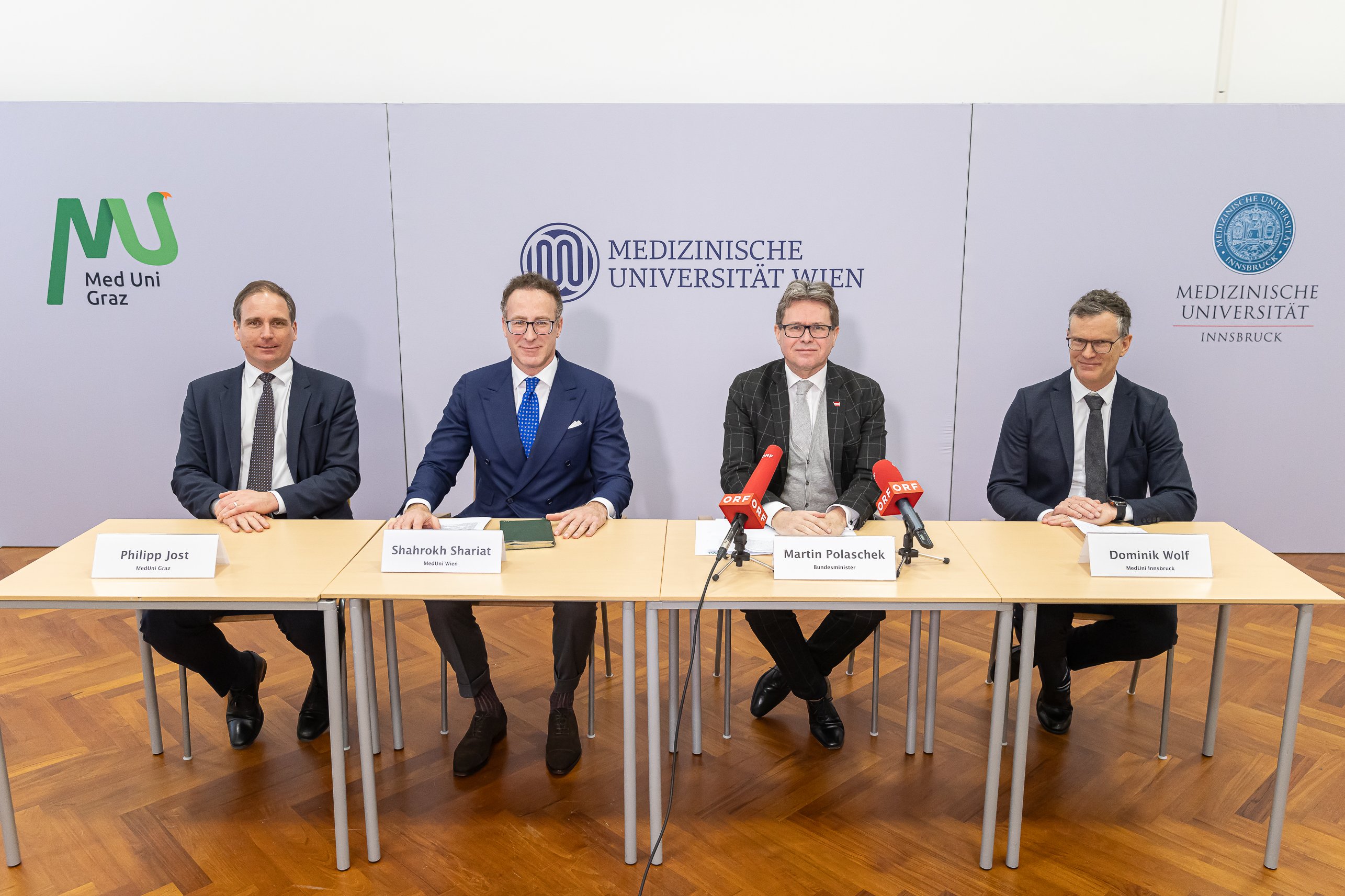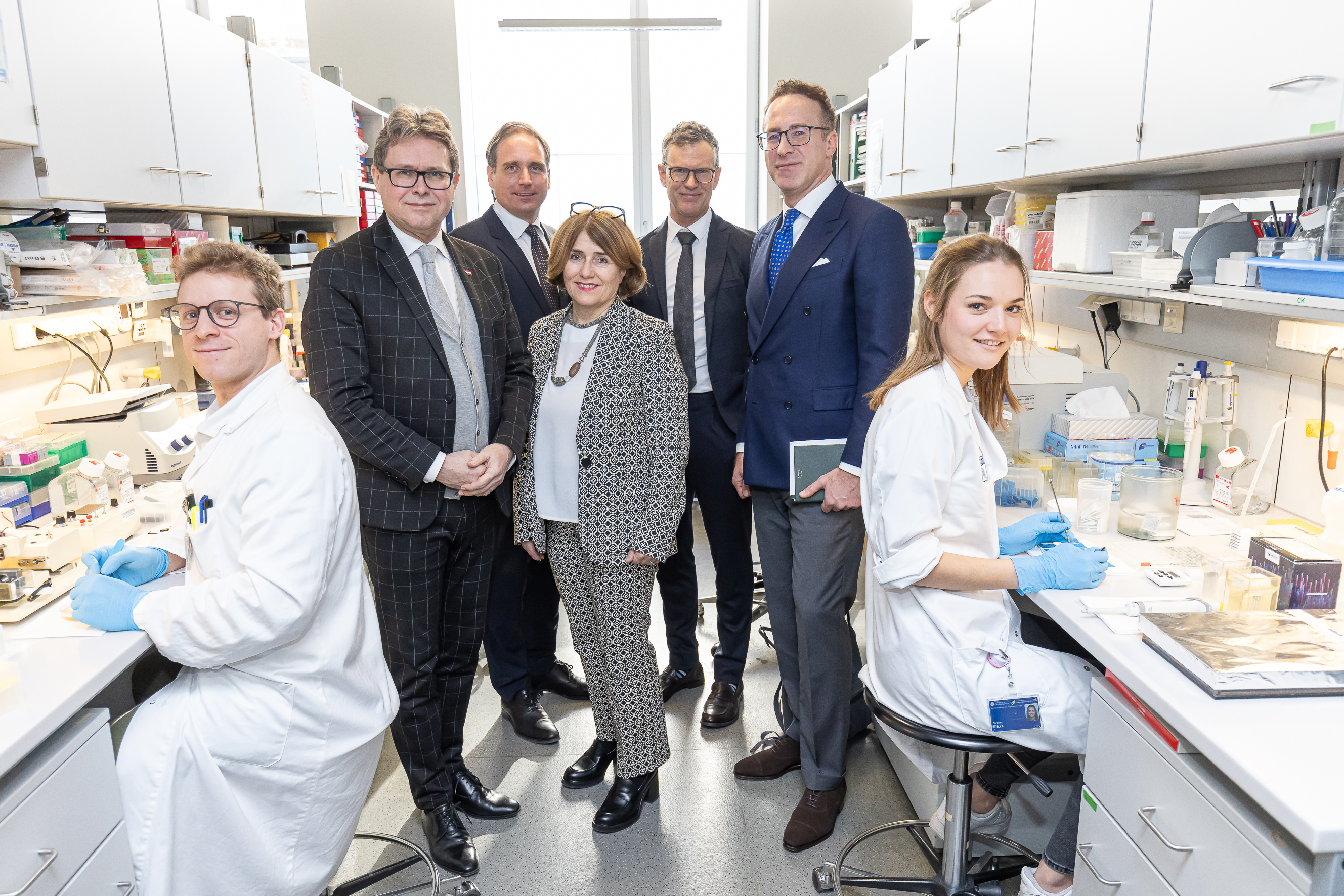
(Vienna/Graz/Innsbruck, 30-01-2024) In the run-up to World Cancer Day on February 4, the medical universities in Graz, Innsbruck and Vienna are announcing an important merger: The newly founded Austrian Comprehensive Cancer Network (ACCN) pools the expertise of the Comprehensive Cancer Centers (CCC) in Graz, Innsbruck and Vienna. This will enable groundbreaking cooperation. The focus is on the goal of further improving the lives of cancer patients by promoting cancer research and optimizing the care landscape. Federal Minister Martin Polaschek supports the project.
In Austria, over 44,000 people are diagnosed with cancer every year. In Europe, 1.3 million people lose their lives to cancer every year. If no further measures are taken, the number of people affected will continue to rise. In order to defeat cancer one day, great joint efforts are being made at EU level as well as in Austria. With the ACCN, the fight against cancer in Austria is being raised to a new level and a lighthouse project is being launched, explained the Federal Minister of Education, Science and Research, Martin Polaschek, and the three heads of the CCC from Graz, Innsbruck and Vienna in a press conference. "Innovative science is being used in Austria to meet the health and social challenges posed by cancer. As Federal Minister of Education, Science and Research, it is particularly important to me to focus on the contribution of research to better coping with cancer and its physical and psychological consequences," said Federal Minister Martin Polaschek.
More people in Austria gain access to cutting-edge medicine
The EU has also declared the fight against cancer to be one of the main tasks up to 2030 as part of its "Horizon Europe" research funding program. The so-called "Mission Cancer" aims to improve the quality of life of people affected by cancer and ensure access to treatment by improving our understanding of cancer and improving prevention, diagnosis and treatment. Austria is acting as a pioneer here with the founding of the ACCN. Resources and expertise are pooled to deliver innovative treatment approaches and research results that directly benefit cancer patients. "One goal of the cooperation partners is to further improve prevention and cutting-edge medicine in oncology and for people in Austria by networking local structures," explains Shahrokh Shariat, Head of the CCC Vienna and Head of the Department of Urology at the Medical University of Vienna and Vienna General Hospital. The ACCN should make it even easier in future to work together within Austria, but also within the framework of EU projects.

Together against cancer: first cooperation projects successfully launched
The close cooperation between the CCCs and other research groups in Austria is already showing initial success in the form of innovative projects. One project coordinated by the Medical University of Innsbruck focuses on the microbiota, i.e. the intestinal flora and its influence on the treatment of bladder and prostate cancer. Every year, 7,000 men in Austria are diagnosed with prostate cancer and 1,200 people are diagnosed with bladder cancer. "Although it is known that the microbiota influences the immune system, its interaction with the tumor environment, the so-called tumor microenvironment, or TME for short, and its diagnostic and therapeutic potential is incompletely understood," explains Dominik Wolf, Head of the CCC Innsbruck and the Department of Internal Medicine V Oncology at the Medical University of Innsbruck. In a collaborative project between various research groups in Vienna and Innsbruck, the microbiota associated with prostate and bladder cancer is currently being investigated for the first time and whether there are, for example, abnormalities in the microbiota that could serve as markers for predicting a treatment response. The findings could also be of great interest for the treatment of other cancers.
Personalized medicine: sound study sets new trends
In recent years, cancer treatment has increasingly developed into precision medicine. Personalized medicine is at the forefront of many tumour therapies. "We are dealing with the current and future challenges of molecular tumor therapy and the question of which genetic mutations in tumors should lead to a change in therapy and which should not," explains Philipp Jost, Head of the CCC Graz and the Clinical Department of Oncology at the Medical University of Graz. This is particularly important as the molecular understanding of changes in tumour cells represents the core of future personalized, targeted and effective tumour therapy. The current SOUND study, which is being coordinated by the Medical University of Graz, is intended to provide an important step towards personalized tumour therapy. The SOUND study is the first multicentre study in Austria to investigate whether patients with advanced cancer can be identified for targeted personalized tumour therapy based on a molecular genetic examination of tumour tissue and/or blood and whether this therapy shows a clinical benefit.